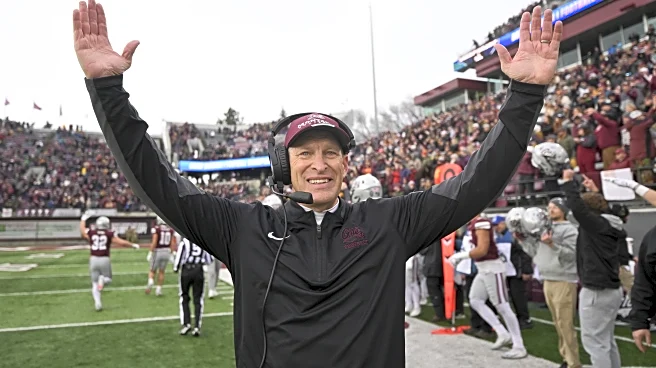What's Happening?
MLB Commissioner Rob Manfred has reignited discussions about league expansion and geographical realignment during a recent broadcast. The proposal suggests adding two new teams, marking the first expansion since 1998 when the Arizona Diamondbacks and Tampa Bay Devil Rays joined the league. This expansion could significantly affect the Atlanta Braves, as cities within 'Braves Country' like Nashville and Charlotte are potential candidates for new teams. Other cities such as Orlando and Raleigh-Durham are also in the conversation, although the addition of a third team in Florida is considered unlikely. The realignment could lead to the creation of eight four-team divisions, allowing teams to play more games within their geographical region, potentially reducing travel and altering playoff structures.
Why It's Important?
The proposed realignment and expansion could have substantial implications for the Atlanta Braves and the broader MLB landscape. By potentially adding teams in the Southeast, the Braves could face new regional rivals, which might increase local fan engagement and rivalries. This shift could also impact travel logistics, reducing costs and player fatigue associated with long-distance travel. Additionally, the restructuring of divisions might lead to changes in playoff qualifications, affecting team strategies and competitiveness. The expansion could also stimulate economic growth in the selected cities, boosting local businesses and increasing job opportunities related to the sports industry.
What's Next?
If the expansion proceeds, MLB will need to finalize the selection of cities for the new teams and determine the specifics of the geographical realignment. Stakeholders, including team owners and city officials, will likely engage in discussions to advocate for their cities as potential hosts for new teams. The league will also need to address logistical considerations, such as stadium construction and scheduling adjustments. Fans and local communities may react to these changes, influencing the league's decision-making process. The timeline for these developments remains uncertain, but the conversation initiated by Commissioner Manfred suggests that changes could be on the horizon.
Beyond the Headlines
The proposed realignment could have deeper implications for the cultural and economic landscape of baseball. By fostering regional rivalries, MLB might enhance fan loyalty and engagement, potentially leading to increased attendance and viewership. The expansion could also reflect broader trends in sports management, where leagues seek to optimize operations and maximize revenue through strategic geographical positioning. Additionally, the inclusion of cities like Montreal and Vancouver in the conversation highlights MLB's interest in expanding its footprint beyond the U.S., potentially tapping into international markets and diversifying its audience base.












